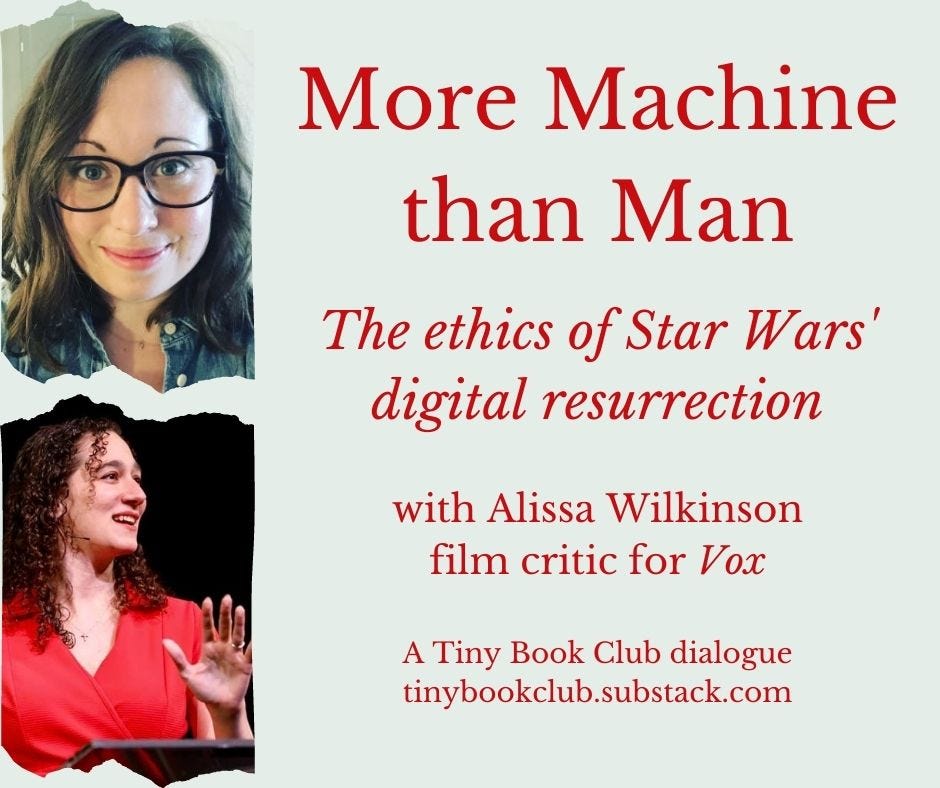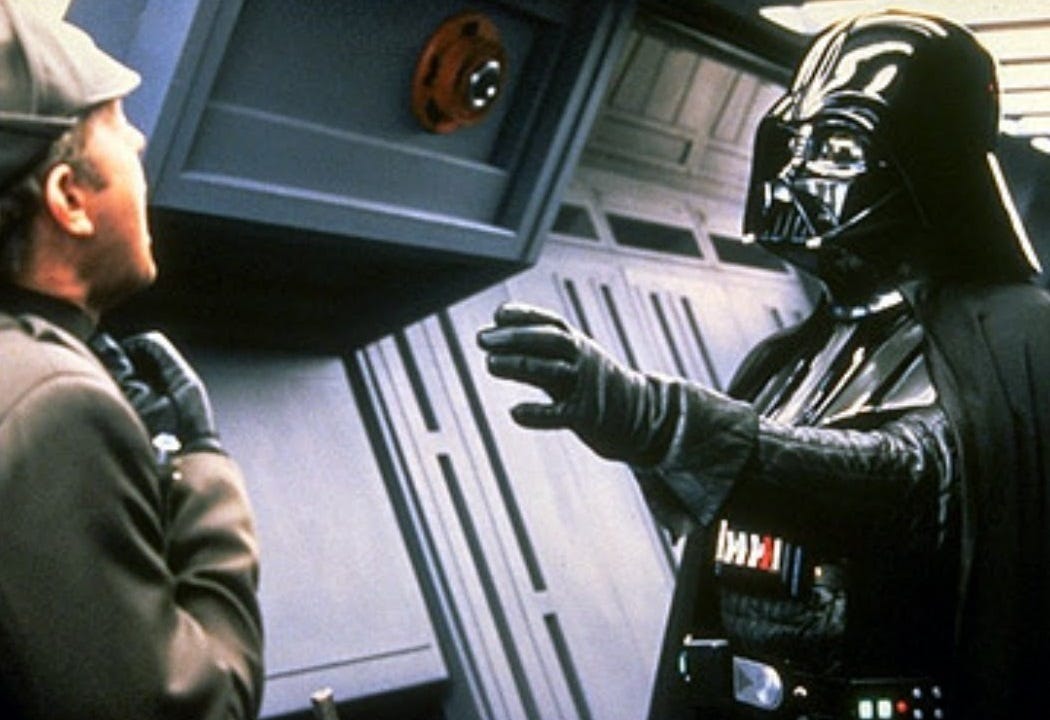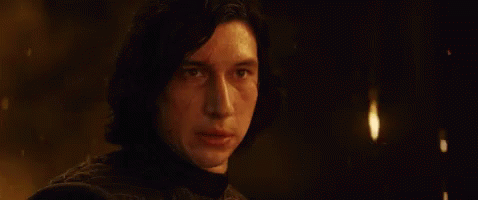When a Sith Runs the Set
Talking to Alissa Wilkinson about what keeps Hollywood from asking "Are We the Baddies?"
In the first part of my dialogue with Vox film critic Alissa Wilkinson, we discussed the perils of too much control over actors, whether through wholly digital simulacra or post-production manipulation. This week we continue our conversation on the dignity of actors sparked by Alexi Sargeant’s “The Undeath of Cinema” and the new Star Wars stories.
Leah: In his essay on Rogue One’s semi-resurrection of Peter Cushing (Grand Moff Tarkin) with a digital double, Alexi gives two examples of moments where having Cushing, the live actor, on set changed the films he was cast in—changes that went beyond just his performance choices in the scene.
Near the end of the filming of Frankenstein Must Be Destroyed, a Hammer Horror executive decided the movie needed to be sexed up for American audiences and insisted on adding a scene of Cushing’s Dr. Frankenstein raping the film’s heroine, Anna (played by Veronica Carlson). Cushing objected to the scene as gratuitous. Ever the gentleman, he apologized to Carlson on set and prevailed on the director to cut short the filming of the rape scene, making it shorter and less explicit. In the end, the scene was not used in the U.S. release of the film.
In a more amusing example of Cushing’s conscientiousness during his Hammer career, we have this story of him working on the 1959 The Mummy. Cushing was, of course, playing the heroic archaeologist opposite Christopher Lee’s reanimated mummy. Cushing was distressed by a fanciful promotional poster for the film that depicted a beam of light passing through a gaping hole in the mummy’s chest. Wouldn’t the audience feel cheated if that image never occurred in the movie? Cushing convinced the director to let him drive a harpoon through the mummy’s chest during a fight scene, thus justifying the poster image. Here was another moment that would only happen with a live actor. Perfectly compliant digital recreations of actors would respond to the studio’s whims rather than acting as a check on them or offering their own flashes of inspiration.
A living actor can shape a film, with suggestions, and simply by saying, “No,” in a way a pliant simulacrum cannot. I appreciate the way that actors can be a check on the demands of directors or of the studio. I love that Emma Thompson threatened to walk out of Brideshead Revisited if the head honchos didn’t stop pressuring Hayley Atwell about her weight.
But this work happens invisibly—we find out later in memoirs or interviews how the actors shaped the work. How do you think about this kind of contribution in your own role as critic? To be honest, I can’t imagine how I’d vote for Best Director—I feel like I’d need to be there on set to understand how directing shaped the final product!
Alissa: I think about directing like conducting an orchestra (or at least that’s the best metaphor I can come up with, as a non-filmmaker). You are coordinating and shaping and subtly moving the pieces around till they reflect your artistic vision, and while there’s collaboration there, for the most part, the director is responsible for whatever ultimately shows up on screen. There are tons of exceptions to this rule, of course—instances like the ones you pointed out, or, more commonly, where the studio insisted on changes (usually during the post-production process) that run contrary to the director’s idea. (You know who loved to do this? Harvey Weinstein.) But, on the whole, directors are basically responsible for the tempo, the look and feel, and the tenor of what ends up on screen.
So to be honest, I actually have an easier time thinking about the director’s contribution than the actor’s! There’s the actual act of, well, acting, which is really hard for me to understand; the only times I start to get it are when I see a good actor give a bad performance, or when I notice that an actor tends to give wildly different performances based on who’s directing them.
But then there are those other contributions from the performers that would slip away if directors were directing digital avatars, whatever that might look like in the future, instead of humans. I think one thing that’s important to remember here is that for an actor to actually exercise that kind of input or influence, they have to be valuable in some way to the production, or potentially even irreplaceable. Usually that comes with being well-known—a star, basically. Sometimes, as with Cushing and the harpoon, it just comes with the director being willing to listen. But in an example that has moral or ethical weight, it takes a great deal of confidence and some measure of certainty that you won’t just be replaced. (See again: Harvey Weinstein.)
So this may be what frustrates and frightens me even more about the potential of digital actors replacing real ones. Most performers on a set never get that kind of input to begin with, and now they can just be replaced. The need for a director to collaborate with human performers goes down—and, as Alexi says, this definitely has the potential to drive down and flatten the collaborative creativity that makes filmmaking such a joy, and such an interesting art form.
Another way of saying this is that the people with the money and the decision-making power, who already probably wield too much of it in many cases, now will have even more of that, because they have a trouble-free option. It’s an expensive one now, and it does not quite work yet (the uncanny valley has not been overcome, in my experience). But it absolutely will in the future. Again, Hollywood’s main goal is to make a lot of profit, and it just so happens the way they do that is by hiring artists to make something they can sell. In the future, they might be able to cut the artist out of the picture, and they won’t hesitate to do so if it seems like it might make more money.
Leah: You’re right that a collaborative approach depends on actors (and crew members) being valued and not being treated as replaceable widgets. Directors can work with an attitude of receptivity, creating a fertile environment for good ideas, but I suspect that approach is valued less partially because of our culture’s misogyny. We value singular, visionary work more than being thoughtfully malleable and receptive to the ideas of others.
Finally, you and I both loved The Last Jedi, which was a polarizing film. For me, it redeemed the weaknesses of The Force Awakens because it took the sometimes lazy nostalgia of that film and made the question of how we let ourselves be shaped by our past the central question of the trilogy. And then… the final film dropped the question entirely.
We’ve half joked that we’ll let our children watch Episodes VII and VIII and then assign them to write a story treatment for Episode IX. Do you have a story arc or a set-up you would have picked for the final episode? Extra credit if you have a title.
Alissa: Wow, this is an incredible question, and I love your idea. I never think in these terms! I think the thing that most excited me about The Last Jedi was the notion that they hadn’t really understood the Force yet, and that it might be something anyone could harness—that it didn’t “belong” to just a couple of families. (I suspect I have some theological reasons for loving that idea?)
So I really wish they’d played with that more, and to be honest, I’m not sure why they didn’t (other than craven fan service)—it would have opened up a lot of space for future sequels and… merchandising?
Leah: For my own Episode IX, I’m very tempted to end Episode VIII shortly after Kylo’s “Join me… please” to Rey (even though I’d lose the magnificent Luke finale—this would be my greatest regret). The Last Jedi promises us not a resurrection of the Jedi order (as conveyed through the game of telephone of Yoda’s abbreviated training of Luke and his brief time with Rey) but the creation of something new, that will reckon with the Jedi’s errors.
I wanted to see Rey and Kylo working together to reckon with how to build on the damaged foundations they were given. One of the weaknesses of the new trilogy was the forced reset where the triumphant Rebel Alliance is on the run again as underdogs, and neatly avoids having to take responsibility as a real power. Kylo makes the same dodge after killing Supreme Leader Snoke and inheriting none of his responsibilities for directing the First Order. So let’s make it…
Episode IX: The Fragile Alliance
I strongly agree with Rosamund Hodge (author of Crimson Bound) that Kylo’s whole arc replaces the real work of making amends with a cheaper death-as-redemption. (The below is part of a thread).

If the original trilogy was about having faith in the Force and being willing to do the right thing without a clear path from there to victory, I wanted the new trilogy to be about living out this faith in smaller ways—not by blowing up ever-larger Death Stars, but about building something new from the rubble.
I would be only too happy to close out the year by running some of your own Episode IX pitches. Extra credit for titles.





What a great conversation!
A new development since I wrote the piece is the tech used on the Mandalorian, particularly the 360 degree LED-screen setup called "The Volume" that replaces traditional locations or sets. Here's a fascinating article on it: https://ascmag.com/articles/the-mandalorian
I'm less bothered by digital simulacra used as sets than I am by similar tech masquerading as actors. Perhaps it's my stage background, but I'm not so worried by about fake backdrops! It still seems to give the performers the chance to be "the real frog in the artificial garden." And yes, I think the Mandalorian clears this bar, even though its protagonists are a puppet and a man in a mask. What do other folks think? Are there worries I should be considering?
Star Wars Episode IX: Revenge of the Myth
After the events of Episode VIII, Rey's memory of Luke's struggle with the future of the Jedi Order enters the oral tradition. (As we all know, there's no evidence anywhere in the Star Wars films of a robust reading or writing culture — https://www.tor.com/2012/10/03/most-citizens-of-the-star-wars-galaxy-are-probably-totally-illiterate) Much like the Christian film community circa 2016-17, citizens dispute whether Luke's vision of Yoda was a genuine apparition or a malign temptation from the Dark Side. A faction of antinomian post-Jedi mystics emerges, clashing with a group that seeks to revive the hierarchy, dogmatism, and genetic determinism of the Temple-era Jedi. Meanwhile, the Force continues to manifest itself in inconsistent and unpredictable ways.
Centuries go by. Much, much later, in a galaxy far, far away, a filmmaker in California has a dream…